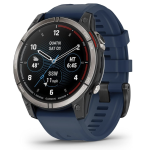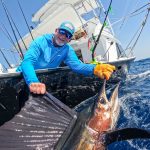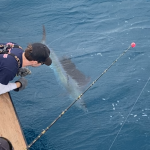Article Courtesy: inthebite.com | Originally Published: 4/6/2022 | Click here for original article
What it Really Takes to be a Captain
By Dave Ferrell
Taking the helm of a sportfishing boat, traveling the world’s oceans in pursuit of billfish, represents a “dream job” for a whole lot of people…many of which have never spent much time offshore. The image of a tanned captain, beard wagging in the sea breeze, steering the boat over the horizon with nothing but freedom and fishing on the calendar for the days ahead, fuels a lot of daydreams in corporate boardrooms all across America. It’s like being a quarterback for the Dolphins (Give me a break, I’m from Florida!)…you just can’t imagine having a bad day at the office!
Well, you all know that while that there are some incredible perks that may come along with the job—travel to foreign hotspots; extra tournament money; insane bites; and making incredible memories. The captain’s chair, however, also comes with a whole host of pitfalls and enormous responsibilities, not the least of which is having the lives of your crew and guests in the palm of your hand.
Along with all the life-and-death stuff, a captain also takes care of a state-of-the-art piece of functional artwork that may cost many millions of dollars. You almost need to be a museum curator and an industrial engineer rolled into one to care of one of these machines, and we haven’t even started fishing yet! If all of this weren’t enough, a captain must also skillfully navigate a whole host of egos and character flaws that find their way onboard. You know the type – the psychotic mates that seemed just fine back on the dock or an owner’s guests that can drink more liquor in one day than an entire frat house consumes on homecoming weekend!
Factor in the competitive fishing aspect, whether that means tournament success or just keeping up with the rest of the dock every day, and the captain’s chair turns into a hot seat rather quickly if your boat doesn’t live up to the owner’s expectations. As dream jobs go, it’s one of the toughest ones there is. Amazingly enough, there’s no one route to the captain’s chair. If there ever was one single path, it’s no doubt changed dramatically over the last 25 years or so, just as certain aspects and responsibilities of the job have as well.

Run Before You Fly
One of the few things you can get captains to agree on is that you have to be a good mate before you can be a good captain. I first met Capt. Newt Cagle while he was working the deck for the legendary Capt. Butch Cox at Marlin U in the Dominican Republic. He instantly impressed me with his teak-side manner, treating my students like royalty and patiently answering all their questions as politely as possible…even the most absurd ones. He was an excellent mate and has since become a successful captain on the tournament trail. That’s not a coincidence. “A captain is only as good as his mate. A good mate really makes the captain shine. No matter how good the guy upstairs is, if you don’t have a good mate things aren’t going to go well.”
Legendary Capt. Randy Baker came to fame as one of the best mates in the world, not as a captain. He’s since made quite a name for himself upstairs as well. Baker got his start on his father’s charter boat and on the docks in Destin, Florida. He began working on private boats in his teens and soon found himself working on the most prestigious fishing team in the world, Dunaway’s fabulous Madam and Hooker operation.
“I preferred the mating part in my early days. But in my opinion you can’t be a good captain unless you’ve been a good mate for a while…you really need to know both sides of it,” says Baker. “It’s very important to get on a good boat that travels and fishes a lot. You have to get some good time on the water. You definitely need to be a mate before you step up to the wheel. That way, you know what the guy’s going through down in the pit.”
Baker’s first day as a captain was on the Hooker, a pretty sweet first captain’s gig. “I mated on the boat for several years, and after a while, I became like the second captain. Whenever Trevor [Cockle] had to leave or take care of something, I’d run the boat. My first full-time captain’s job was with Jerry Dunaway when we built the 43-foot Hooker that was sent to Madeira. Fishing and working on boats is all I’ve ever done…I’ve never had a job on land.”

When it comes to fishing, Capt. Bill Harrison has done it. When he speaks of perspective, it is best to listen.
Capt. Bill Harrison got his start on Miami’s legendary Pier 5 in the early 50s. He went from working the decks of full-time charter boats to chasing blue marlin all over the Caribbean with Ralph Christianson. He agrees with Baker and Cagle and thinks it’s imperative that a captain starts out as mate.
“I like those guys who are doing the same things at 60 that they were doing at six,” says Harrison. “A lot of guys never even cared about becoming a captain. They were good mates. And they enjoyed doing that. It was a 9 to 5 job for those guys back then. They were in it to make a day’s pay. They’d get off the boat and didn’t want to talk about fishing or anything like that. It was just a job. Sometimes these guys would be 30, 40 or 50 years old.”
Harrison says that the reason the mates and captains at Pier Five were so good was that they pursued a wide variety of different species. “We learned how to catch everything because we would sell it. We could catch sharks, groupers, mackerels, whatever was running we were fishing for it. This translated to learning a lot of different fishing techniques,” says Harrison.
On that first trip, Newt told me that he wanted to be the captain of a sportfishing boat for as long as he could remember…he never wanted to do anything else.
“I was very lucky to grow up around boats and fishing, so it’s all I really ever knew. My father was an owner-operator and my uncle owned a charterboat,” says Cagle. “I started out by washing boats for free, just so I could ride out and be a part of the team. I’d help the mate out, watch the baits and do anything just to learn from those guys. That’s something that’s changed quite a bit.”
“There’s no longer any kids coming around these days with the burning desire to work on the boat or get the chance to be around the boat. Nowadays when a kid wants to go fishing, he wants to know exactly what he’s going to get paid. And he already has a list of demands for me! I would do anything just to get to go fishing. I’d drive on the ride out or in, let the captain take a nap, do anything just for the chance to go. Kids today won’t even do that now. Everybody you talk to is going to give you the same story,” says Cagle.

Keeping Up Electronically
One of the greatest challenges that today’s captains face is the rapid pace at which ship’s systems evolve. From the complex navigation and communication suites on the flybridge to the electronic engine controls down below and the high-tech A/V equipment in the salon, the race to keep up with the latest and greatest, or just to keep things working properly, can run a crew ragged. Experience with how boats are put together and how all these systems operate and interact goes a long way these days.
“My dad built several boats and I was always very involved in the build. My dad was a very hands-on guy, so it was a sad day around here if he had to call a mechanic or someone to fix something. I try to fix everything on the boat by myself. But I also realize that a man has to realize his limitations,” says Cagle. “You can screw something up worse if you try to fix it without knowing what you are doing.”
“Nowadays you really can’t do anything with the motors. If you get a problem and try and tackle it yourself you can make it worse or mess up your warranties,” says Cagle. “One thing that has really changed things for me has been the internet. Instead of calling my Dad or other people, I can just look online. I hate to say it, but if I have a problem or project, I have no problem going online to read other people’s advice on how to go about fixing it. This is especially helpful with my electronics. Instead of pushing buttons for hours on end, I can Google the problem and find several ways to do what I need to do.”
Baker grew up around boats so maintenance and mechanicals are second nature to him. But even he takes pause when it comes to messing around too much with the today’s new engines. “I can do all the maintenance and troubleshooting to a degree. But there’s so much computer stuff going on it’s better to just have the guys hook it up to the laptop,” says Baker. “I’m kind of old school that way. It’s been a little hard keeping up with all that stuff…I’m not that computer literate myself.”
“Unfortunately, there’s no textbook to live by,” says Cagle. “There’s no standard operating procedure on how to be a boat captain or how to be a mate. It’s all about what you learned from the guys you worked for in the past. How they did things is normally how you do things. You just have to use your best judgment. There’s no manual you can refer to. The only thing you can do is hope you had a good teacher along the way.”

First Time Out
“The first time I got to run a boat by myself and take people fishing, I was 16-years-old fishing out of Oregon Inlet at Pirates Cove Marina a couple of days before the Pirate’s Cove tournament,” says Capt. Newt Cagle. We had a group of people who were going to pre-fish the tournament. My father had come down with a case of food poisoning. And he came down to the boat in the morning and asked me if I could take the party out. I said, ‘Sure, I’d love to.’ At first I was a little bit nervous. But soon I said, ‘Screw It, I’ve been watching him do this my whole life.’ I pulled her out of the slip, followed a charterboat out and went fishing.”
Cagle’s first day at the helm proved to be a prophetic one.
“My Dad always told me to never fish in the fleet…always fish on the outskirts. John Bayliss was running the Ultra at the time and was having some real good fishing in the middle of the fleet. I was staying on the outskirts getting bite after bite. But I got sucked into the fleet and went in there for a couple of hours and didn’t catch much. Once I moved back outside, we started getting bit again. We quit early at 2:30 p.m. and caught nine white marlin. Bayliss stayed until dark and caught 11. Then as now, John Bayliss is considered one of the best in the world. So not only was I happy to get in and out of the slip, but we had a really good day of fishing following my Dad’s advice…which was pretty special.”
Cagle’s first full-time captain’s job came in a more round-about way. Cagle started running the Sea Angel a 59-Weaver. “The owner was walking up and down the dock trying to hire a captain because his one captain was leaving and a hurricane was coming,” says Cagle. “He talked to me briefly and they moved the boat to the Dominican Republic. After two or three days, I was on a plane to the DR fresh after a hurricane to step onto a boat I had never driven in my life. We went fishing the next day – my first day in the DR – and we caught two blues and sail.”






